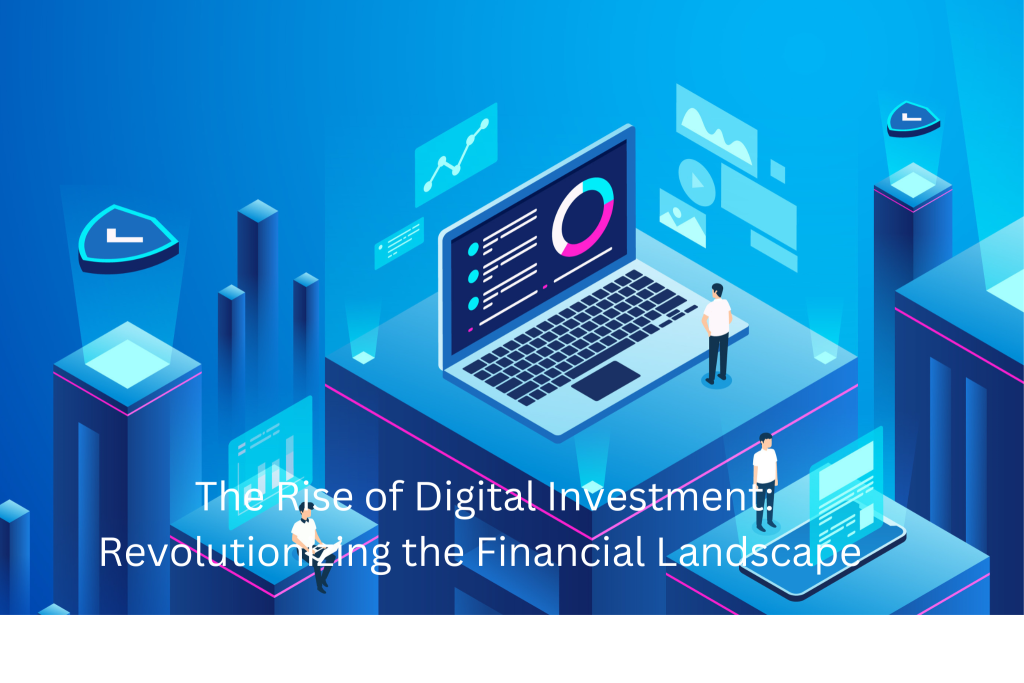
In recent years, the world has witnessed a seismic shift in the way investments are made. Traditional avenues like stocks, bonds, and real estate have been joined, and in some cases overshadowed, by the rise of digital investment platforms. This transformation has democratized investing, making it accessible to a wider range of individuals and revolutionizing the financial landscape. In this article, we will explore the concept of digital investment, its benefits and risks, and its potential impact on the future of finance.
Understanding Digital Investment
Digital investment, also known as online investing or robo-investing, refers to the use of digital platforms and algorithms to automate investment processes. These platforms eliminate the need for traditional intermediaries, such as brokers or financial advisors, by leveraging artificial intelligence (AI) and machine learning technologies. Digital investment platforms offer users a streamlined and user-friendly experience, making it easy to invest in a variety of assets, including stocks, bonds, exchange-traded funds (ETFs), cryptocurrencies, and more.
The Benefits of Digital Investment
a) Accessibility and Affordability:
Digital investment platforms have significantly lowered the barriers to entry for individuals looking to invest. They allow anyone with an internet connection and a small amount of capital to participate in the financial markets. Additionally, these platforms often offer lower fees compared to traditional investment options, making them more affordable for retail investors.
b) Diversification and Customization:
Digital investment platforms provide users with a wide range of investment options, enabling diversification across asset classes and geographies. Furthermore, these platforms use algorithms to tailor investment strategies to individual preferences and risk tolerance, allowing for personalized portfolios.
c) Transparency and Control:
Unlike traditional investment methods, digital investment platforms offer real-time access to investment information and portfolio performance. Investors can monitor their investments, track market trends, and make informed decisions based on up-to-date data. This transparency gives investors a greater sense of control over their financial future.
Risks and Challenges
While digital investment offers numerous advantages, it is not without risks. Some of the key risks include:
a) Technology Risks:
Digital investment platforms rely on technology infrastructure, and any system failures or cybersecurity breaches can lead to financial losses or compromised personal information.
b) Lack of Human Touch:
Although algorithms provide automated investment advice, they may not fully capture the complexities of an individual’s financial situation or emotions associated with investing. The absence of human guidance may leave investors vulnerable to making impulsive decisions during market downturns.
c) Regulatory Environment:
The rapid growth of digital investment has prompted regulators to adapt and establish guidelines to protect investors. However, regulatory frameworks are still evolving, and potential gaps or uncertainties in regulations can pose challenges for both investors and platform providers.
The Future of Digital Investment
The digital investment landscape is poised for continued growth and innovation. Some of the future trends and developments include:
a) Integration of AI and Machine Learning:
As AI and machine learning technologies advance, digital investment platforms will become increasingly sophisticated in their ability to analyze data, identify investment opportunities, and optimize portfolios.
b) Expansion of Cryptocurrency Investing:
Cryptocurrencies, such as Bitcoin and Ethereum, have gained significant traction in recent years. Digital investment platforms are likely to expand their offerings to include a broader range of cryptocurrencies, catering to the growing demand for digital assets.
c) Socially Responsible Investing:
Increasingly, investors are seeking opportunities that align with their values and promote positive social and environmental impact. Digital investment platforms are expected to incorporate more options for socially responsible investing, catering to this evolving investor preference.
Conclusion:
The rise of digital investment has revolutionized the financial landscape, offering individuals unprecedented access, convenience, and control over their investments. With its accessibility, affordability, and customization options, digital investment has democratized the world of finance, empowering retail investors and reshaping traditional investment practices.
While digital investment comes with risks, such as technology vulnerabilities and the absence of human guidance, these challenges can be mitigated through robust cybersecurity measures and investor education. As regulators adapt to this evolving industry, the framework for digital investment will become more defined, providing a safer environment for investors.
Looking ahead, the future of digital investment holds immense potential. Advancements in AI and machine learning will enhance the capabilities of digital investment platforms, while the expansion of cryptocurrency offerings and socially responsible investing will cater to evolving investor preferences.
As we move forward, it is crucial for investors to embrace the opportunities and navigate the risks associated with digital investment. By staying informed, exercising caution, and leveraging the benefits of these platforms, individuals can take advantage of the transformative power of digital investment to secure their financial future.
